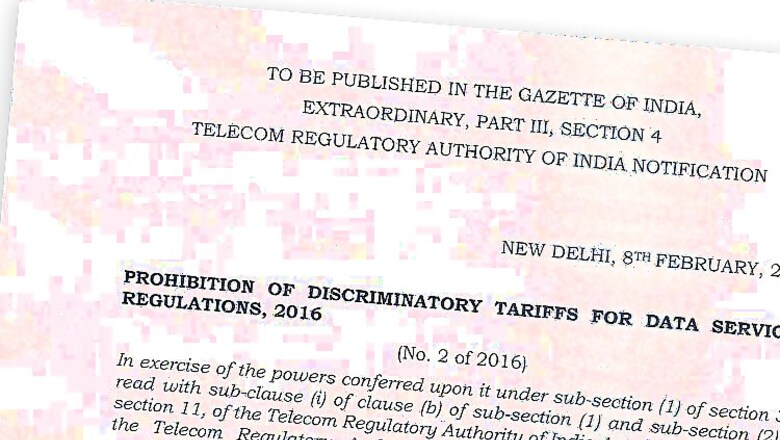
views
The Telecom Regulatory Authority of India (TRAI) has ruled against differential pricing for Internet services in India. This is a major setback to Facebook's plan to roll out free Internet via its Free Basics platform in India.
Facebook's Free Basics plan, launched in around three dozen developing countries, offers pared-down web services on mobile phones, along with access to Facebook's own social network and messaging services, without charge. Critics had argued that allowing access to a select few apps and web services for free violates the principle of net neutrality - the principle that all websites and data on the Internet should be treated equal.
Here are 10 important highlights from the 15-page 5600-word 'Prohibition of Discriminatory Tariffs for Data Services Regulations, 2016' (Read full text):
1. Telecom service providers (TSPs) are prohibited from offering different tariffs based on the content, service, application or other data that a user is accessing or transmitting on the internet. Tariff for data services cannot vary on the basis of the website/application/platform/ or type of content being accessed.
2. A service provider may reduce tariff for accessing or providing emergency services, or at times of grave public emergency.
3. Direct the service provider to withdraw such tariff and also order such service provider to pay, by way of financial disincentive, an amount of rupees fifty thousand for each day of contravention, subject to a maximum of rupees fifty lakh:
4. The Authority may review these regulations after the expiry of a period of two years from the date on which these regulations come into effect, or on any earlier date as it may deem fit.
5. Allowing a TSP which is at one edge of the Internet to charge differentially for data that it does not alone process, could compromise the entire architecture of the Internet itself.
6. Allowing price differentiation based on the type of content being accessed on the Internet, would militate against the very basis on which the internet has developed and transformed the way we connect with one another.
7. In India, given that a majority of the population are yet to be connected to the internet, allowing service providers to define the nature of access would be equivalent of letting TSPs shape the users' internet experience. This can prove to be risky in the medium to long term as the knowledge and outlook of those users would be shaped only by the information made available through those select offerings. Further, to the extent that affordability of access is noted to be a cause for exclusion, it is not clear as to how the same users will be in a position to migrate to the open internet if they do not have the resources to do so in the first place.
8. Price-based differentiation would make certain content more attractive to consumers resulting in altering a consumer's online behaviour. While this might not be a major concern in a country where the majority already has Internet access, in a nation like India which is seeking to spread Internet access to the masses, this could result in severe distortion of consumer choice and the way in which users view the Internet.
9. TSPs are also prohibited from entering into arrangements that have the same effect as charging discriminatory tariffs on the basis of content. Thus, an arrangement by which, instead of a service provider differentially charging tariffs to the consumer, other arrangements are made by the TSPs which in effect make accessing some content cheaper, for example through a refund to the consumer or other methods, are likewise barred.
10. Differential tariffs being offered for data transmitted over closed electronic communications networks, such as intranets are not prohibited by these regulations. Though the prohibition on discriminatory pricing of data services does not apply to such networks, which are not accessing the Internet, if such a closed network is used for the purpose of evading these regulations, the prohibition will nonetheless apply.
11. This prohibition shall not apply to other forms of tariff differentiation that are entirely independent of content. For instance, providing limited free data that enables a user to access the entire internet is not prohibited.
12. These Regulations will come into effect immediately. From the date these regulations come into effect, no new launches of prohibited packs, plans or vouchers shall be permitted.
13. No plan, pack or voucher already subscribed by a pre-paid or post-paid consumer providing differential data tariff based on content, shall be in operation beyond a period of six months from the date of these regulations coming into effect.


















Comments
0 comment